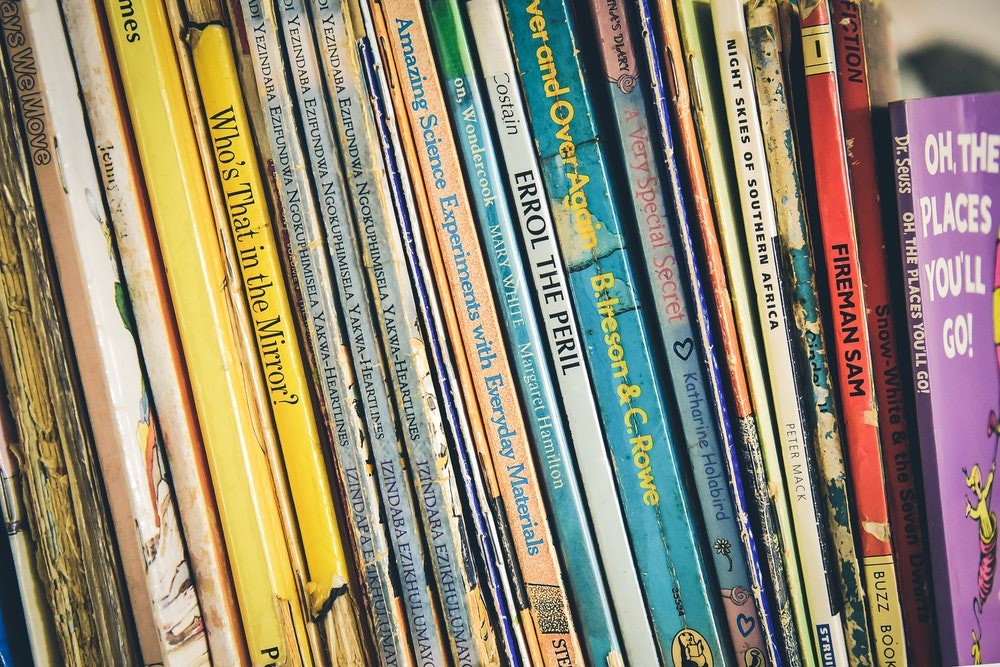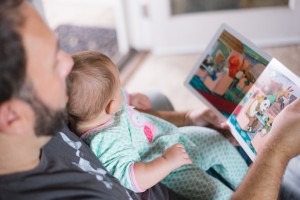The most precious gift we can give our children is spending quality time with them. Time is something that, nowadays, none of us seem to have enough of; making it all the more precious.
Reading to our children is probably the most rewarding and effective way of spending quality time and something that we should all strive to do every single day – just ten minutes at bedtime will be the best spent time of your day for the innumerable benefits to be gained. So, what are these benefits? Why should we be investing our precious time reading to our children? And what’s the best way to do it?
Reading Develops the Parent-Child Relationship
Children feel valued when we spend time reading to them; it makes them feel special. Choosing to read with them lets them know that they are worthy of your time, thus boosting their sense of self-worth. It’s also a calm, relaxed time when you can snuggle together and experience that warm feeling of closeness and safety. This closeness actually has a positive effect on our brain chemicals, causing our brain to release oxytocin which, in turn, strengthens the bond; creating a positive cycle.
So, how does oxytocin work?
Oxytocin plays an important role in social bonding; it is the chemical foundation on which trust is built and it makes us care about others. It’s released during childbirth and is responsible for the initial bond between mother and baby. Snuggling together whilst reading also releases oxytocin which helps to strengthen the bond between you and your child.
Spending time reading with your child can also increase their appropriate behaviour and is likely to make them more compliant. This is not only because of the improved relationship which, in itself, results in more positive behaviour, but it’s also because it allows children a much-needed opportunity to be in control. Children don’t have many opportunities to legitimately be in control of their lives; allowing them to choose the book gives them a sense of control which, in turn, makes them more likely to be compliant when you need them to be.
Reading at bed-time makes for a better night’s sleep and should be an integral part of your bedtime routine. The feeling of safety and security this gives them is a crucial factor in being able to sleep soundly. This calm, relaxed closeness has benefits to you too, helping you to relax and unwind after a busy day and preparing you for the evening ahead.
Reading Develops the ‘Whole’ Child
All children are born with imaginations, which tend to peak between 3 and 6 years of age. If not nurtured and encouraged, imagination often starts to decline when children begin their more formal education. Reading helps nurture a child’s imagination, which, incidentally, Webster defines as: ‘the act or power of forming a mental image of something not present to the sense or never before wholly perceived in reality’.
This is exactly what children are doing when we read to them – forming a mental image of something not present. Reading can open up whole new worlds of fantasy, in the form of characters and places. But it can also help children to learn about things in the real world. Having a wide variety of books available can help children learn so much about the world around them.
Reading to our children also develops their vocabulary. When we read to our children we can choose more advanced books, with words and phraseology they may not yet have come across; we just need to stop to explain the meaning of any unfamiliar words; expanding their vocabulary, as well as their creativity.
Reading also helps to develop emotional literacy and empathy. You can stop whilst reading to discuss how the characters might be feeling and how your child might feel in a given situation. This helps them to understand their own feelings, as well as relate to how others might be feeling. You can even choose specific books to talk about issues; there are lots around that deal with particular issues, such as friendship, being different, sharing.
 Reading with your child helps to develop a love of reading, which is likely to last a lifetime. This is particularly important in today’s world, where children who are bored will often turn to technology, which, although it has many benefits, comes with its own unique downside. Children who have a love of books and reading are likely to turn to a book instead, which comes without all the negative aspects of technology (but that’s a blog for another day!).
Reading with your child helps to develop a love of reading, which is likely to last a lifetime. This is particularly important in today’s world, where children who are bored will often turn to technology, which, although it has many benefits, comes with its own unique downside. Children who have a love of books and reading are likely to turn to a book instead, which comes without all the negative aspects of technology (but that’s a blog for another day!).
Reading Helps Children’s Academic Success
Reading is important in ALL academic subjects and research shows that children who enjoy reading do better in all subjects, not just literacy.
We’re probably all aware of its importance when it comes to writing, history, geography and science, but reading is also important for maths. In fact, there’s a very close link between literacy and maths and often when children struggle with maths, it’s because of literacy issues. Barton (2008) argues that ‘mathematics and language develop together’.
Reading has a particularly important role to play in developing children’s writing. Not only for all the reasons stated earlier – improved vocabulary, imagination, creativity but, when you read out loud, children hear you stop at full stops and pause at commas; this attunes their ear to instinctively know where punctuation should be placed in a sentence. Following along with you as you read let’s them see how speech marks and other forms of punctuation are used. All this makes for better writing.
Sitting (or lying) and listening to a story helps improve children’s concentration and focus, which has obvious benefits to success in school.
The earlier you start the better. Your baby got used to the sound of your voice whilst in the womb so hearing you read a story (even if they can’t initially understand it) is soothing to them and will capture their interest.
It is also important for brain development as it helps to make those vital neuronal connections. Infants can show an interest in books from a very early age – choose books that will survive being sucked and chewed – hard-board, vinyl or cloth.
How to Make the Most of Reading Together
Reading should be an integral part of your daily routine and should be prioritised. The best time to read is at bedtime (for all the reasons stated above), although even better if you can read at other times during the day too.
Try not to allow other things to get in the way of reading – make it a habit that can’t be broken and always allow enough time for it to be part of the bedtime routine, it doesn’t need to take that long – just ten minutes is sufficient. Make sure that reading time isn’t interrupted; turn off the television and phone. Lie down on the bed next to your child so that they are able to see the book as you read. If you have more than one child of similar age, you can read to them both together – one lying on either side of you (you can alternate whose bed you lie on). If the age gap is larger, then read to each child individually, so that you can make the books age appropriate and stagger their bedtimes accordingly.
Have a variety of different types of books available and let them choose which one. Don’t worry if they choose the same book over and over again; this is particularly common for younger children and is a way of them consolidating their learning. Young children love repetition, and being able to anticipate what’s coming next, and will begin to join in with ‘reading’ the book.
For younger children, have lots of rhyming books like those by Dr. Seuss. Children’s ability to recognise rhyme is a predictor of later reading success, not to mention that those types of books are so much fun and children love to join in once they become familiar with them. You can also make up your own silly rhymes and encourage your children to do so too.
Don’t be afraid to use silly voices when reading. Give different characters a different voice and make animal and engine noises too. Children love being silly and it’s good for you too. Laughing together is also great for bonding and is a great stress reliever.
Reading to your child doesn’t have to cost much. Join the library and let your child choose from the hundreds of books available. Charity shops are a great source of children’s books too and even the pound shop has a range of children’s books available.
Don’t limit yourself to reading actual books. Make up your own stories with your children as the main characters. Children love being part of a story and will soon start to chip in with their own additions and embellishments – again this is great for developing their imagination.
Don’t stop reading to your children just because they become proficient readers themselves. Reading to an older child is still important; particularly for that sense of closeness and togetherness, which we tend to have less opportunities for as our children get older.
Furthermore, as children get older their books become more interesting (for us). There are some amazing early-teen books out there that can be enjoyed by adults just as much as by teens. You can then read a chapter per night, rather than a whole book. This is also good for keeping the lines of communication open with your teenager as you can discuss relevant issues arising in their books.
Well, I’ve gone on rather longer than intended but I’m such a firm believer in the importance of reading to your child. I really do think it is one of the best gifts you can give them and something that will last them a lifetime. You’re also creating memories, something that can’t be bought. And, if you make a habit of reading to your children, then they are likely to continue the habit with their own children. So don’t delay – start today!
Leave Your Reply
You must be logged in to post a comment.





